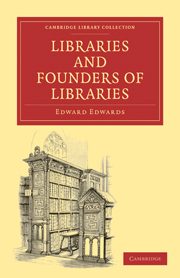Book contents
- Frontmatter
- PREFACE
- Contents
- LIBRARIES, AND THE FOUNDERS OF LIBRARIES
- CHAPTER I INTRODUCTORY.—THE ANCIENT LIBRARIES OF EGYPT, OF JUDÆA, OF GREECE, AND OF THE ROMAN EMPIRE
- CHAPTER II INTRODUCTORY. — MEDIÆVAL AND MODERN LIBRARIES. — ANTICIPATORY SURVEY OF THE SUBJECT, IN GENERAL
- CHAPTER III OF SOME LIBRARIES OF MONASTERIES ABROAD
- CHAPTER IV OF SOME LIBRARIES OF MONASTERIES AT HOME
- CHAPTER V CONCERNING THE LIBRARIES OF SOME FAMOUS AUTHORS, OF VARIOUS PERIODS
- CHAPTER VI CONCERNING THE LIBRARIES OF SOME CELEBRATED MONARCHS AND ROYAL PERSONAGES, OF VARIOUS PERIODS
- CHAPTER VII HISTORY OF THE OLD ROYAL LIBRARY OF THE KINGS OF ENGLAND
- CHAPTER VIII HISTORY OF THE STATE PAPER OFFICE
- CHAPTER IX HISTORY OF THE PUBLIC RECORDS OF THE REALM, IN THEIR EARLY PERIOD OF GROWTH AND SEPARATE CUSTODY
- CHAPTER X THE LIFE OF THOMAS PARKER, EARL OF MACCLESFIELD.—THE LIFE OF NICHOLAS JOSEPH FOUCAULT.—HISTORY AND DESCRIPTION OF THE LIBRARY AT SHIRBURN CASTLE IN OXFORDSHIRE
- CHAPTER XI THE LIFE OF CHARLES SPENCER, THIRD EARL OF SUNDERLAND. — HISTORY AND DESCRIPTION OF THE LIBRARY AT BLENHEIM PALACE
- CHAPTER XII THE PUBLIC LIFE OF GEORGE JOHN, SECOND EARL SPENCER.—HISTORY AND DESCRIPTION OF THE SPENCER LIBRARY AT ALTHORP
- APPENDIX A LIST AND DESCRIPTION OF EXTANT CATALOGUES OF ENGLISH MONASTIC LIBRARIES, DISTINGUISHING THE UNPRINTED FROM THE PRINTED
- APPENDIX B NOTE ON THE LIBRARY OF KING EDWARD THE SIXTH
- APPENDIX C SUMMARY CLASSIFICATION AND SYNOPTICAL VIEW OF THE PUBLIC RECORDS OF THE REALM
- Plate section
CHAPTER IX - HISTORY OF THE PUBLIC RECORDS OF THE REALM, IN THEIR EARLY PERIOD OF GROWTH AND SEPARATE CUSTODY
Published online by Cambridge University Press: 10 November 2010
- Frontmatter
- PREFACE
- Contents
- LIBRARIES, AND THE FOUNDERS OF LIBRARIES
- CHAPTER I INTRODUCTORY.—THE ANCIENT LIBRARIES OF EGYPT, OF JUDÆA, OF GREECE, AND OF THE ROMAN EMPIRE
- CHAPTER II INTRODUCTORY. — MEDIÆVAL AND MODERN LIBRARIES. — ANTICIPATORY SURVEY OF THE SUBJECT, IN GENERAL
- CHAPTER III OF SOME LIBRARIES OF MONASTERIES ABROAD
- CHAPTER IV OF SOME LIBRARIES OF MONASTERIES AT HOME
- CHAPTER V CONCERNING THE LIBRARIES OF SOME FAMOUS AUTHORS, OF VARIOUS PERIODS
- CHAPTER VI CONCERNING THE LIBRARIES OF SOME CELEBRATED MONARCHS AND ROYAL PERSONAGES, OF VARIOUS PERIODS
- CHAPTER VII HISTORY OF THE OLD ROYAL LIBRARY OF THE KINGS OF ENGLAND
- CHAPTER VIII HISTORY OF THE STATE PAPER OFFICE
- CHAPTER IX HISTORY OF THE PUBLIC RECORDS OF THE REALM, IN THEIR EARLY PERIOD OF GROWTH AND SEPARATE CUSTODY
- CHAPTER X THE LIFE OF THOMAS PARKER, EARL OF MACCLESFIELD.—THE LIFE OF NICHOLAS JOSEPH FOUCAULT.—HISTORY AND DESCRIPTION OF THE LIBRARY AT SHIRBURN CASTLE IN OXFORDSHIRE
- CHAPTER XI THE LIFE OF CHARLES SPENCER, THIRD EARL OF SUNDERLAND. — HISTORY AND DESCRIPTION OF THE LIBRARY AT BLENHEIM PALACE
- CHAPTER XII THE PUBLIC LIFE OF GEORGE JOHN, SECOND EARL SPENCER.—HISTORY AND DESCRIPTION OF THE SPENCER LIBRARY AT ALTHORP
- APPENDIX A LIST AND DESCRIPTION OF EXTANT CATALOGUES OF ENGLISH MONASTIC LIBRARIES, DISTINGUISHING THE UNPRINTED FROM THE PRINTED
- APPENDIX B NOTE ON THE LIBRARY OF KING EDWARD THE SIXTH
- APPENDIX C SUMMARY CLASSIFICATION AND SYNOPTICAL VIEW OF THE PUBLIC RECORDS OF THE REALM
- Plate section
Summary
When a man, though a native of this Island, comes fresh to peruse … a piece of its ancient History,…he is like one newly landed in a strange country. He finds himself in another climate. He observes many things strange and uncouth, in language, laws, customs, and manners But there are some persons who seem habitually disposed to speak meanly of all parts of learning which are not directly lucrative. They are apt to say, “Of what use are these old antiquated things? Give us what is more suitable to the age we live in;” and such like. But if we examine these allegations, they will, I suppose, be found to have no force. Every part of learning is of some use…………History may be said to be two-fold, ancient and modern. The former consists of Antiquities, and cannot, even in thought, be separated from them….The knowledge of Antiquities is a part of Historical learning, and cannot be impugned without impugning History itself.
Madox, The History of the Exchequer, xiii.If there be still reason to regret that no clear and available account of the growth, transmission, and specific characters, of our Records can be found in any one existing book, there is, I suppose, no room for doubt that the deficiency is owing rather to the abundance than to the paucity of the materials. The mass, indeed, of the books about the Records seems to have become almost as appalling, as had been that strange superfetation, upon the Classing of the Records, of an uncouth legistic terminology, which, in union with many other like impediments, for a very long period impoverished our historians, in order to enrich our lawyers.
- Type
- Chapter
- Information
- Libraries and Founders of Libraries , pp. 211 - 326Publisher: Cambridge University PressPrint publication year: 2010First published in: 1864



